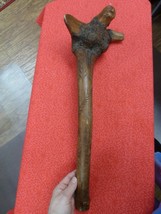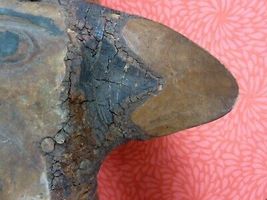Rendered at 15:08:37 10/23/25
Envío gratis
CLUB-18 Genuine Penobscot Native American Root club war weapon ceremonial 1900's
Los buques de
United States

Share & earn! Sign in, share this or any listing, and you’ll get commission when it sells.
Learn more
Las opciones de envío
Estimado para llegar por Wed, Oct 29th.
Detalles
Calculado por USPS en ES.
Los buques de
United States

Política de oferta
OBO - El vendedor acepta ofertas en este artículo.
Detalles
La política de devoluciones
Full refund available within 30 days
Protección de compra
Opciones de pago
PayPal accepted
PayPal Credit accepted
Venmo accepted
PayPal, MasterCard, Visa, Discover, and American Express accepted
Maestro accepted
Amazon Pay accepted
Nuvei accepted
Las opciones de envío
Estimado para llegar por Wed, Oct 29th.
Detalles
Calculado por USPS en ES.
Los buques de
United States

Política de oferta
OBO - El vendedor acepta ofertas en este artículo.
Detalles
La política de devoluciones
Full refund available within 30 days
Protección de compra
Opciones de pago
PayPal accepted
PayPal Credit accepted
Venmo accepted
PayPal, MasterCard, Visa, Discover, and American Express accepted
Maestro accepted
Amazon Pay accepted
Nuvei accepted
Rasgos del artículo
| Categoría: | |
|---|---|
| cantidad disponible: |
Sólo uno en stock, para muy pronto |
| Condition: |
New |
| Tribal Affiliation: |
PENOBSCOT |
| Country/Region of Manufacture: |
United States |
| Provenance: |
Ownership History Not Available |
| Culture: |
Native American: US |
Detalles del anuncio
| Envío de descuento: |
Vendedor paga el envío para este artículo. |
|---|---|
| Publicado en venta: |
Más de una semana |
| Artículo número: |
1495501984 |
Descripción del Artículo
(internal #CLUB-18). Genuine vintage PENOBSCOT Native American Root war or ceremonial club.
This club is circa early 20th century.
Measures 22-1/4" long x 8" across widest part of club, 2" diameter widest on club handle
Huge Native face hand worked and painted on front; smaller Native head on the back; 3 distinct points; handle etched with wheat design and other decorative designs; bottom inch of handle with bark
Weight: 1 pound 11 ounces
ROOT CLUBS
Background information from
PENOBSCOT NATION MUSEUM - OLD TOWN, MAINE
Root Clubs were made from root bundles of immature gray birch trees (not war clubs, there was no word for war among this tribal nation) new old. Short clubs used to finish off a kill on an injured animal, longer clubs made later to stave off soldiers that had spears as weapons. They believed they were releasing the spirits of animals birds from the wood they were making into art. The clubs were also carried in dances and religious ceremonies.
Penobscot Native people in Maine sold off some of their ancestor's clubs, then began making new ones, and re-purchasing the ancient ones, to preserve their Penobscot Wabanaki cultures.
After digging up a small tree with most roots
intact, carvers trim and sometimes completely remove the bark of the sapling.
The roots are sharpened and shaped into points, occasionally an animal or
spirit will be created on a root point. Human or spirit faces or animals are
created in the root ball under the points, sometimes incorporating a root point.
The stock of the small tree becomes the handle and is then decorated with small
cuts; "chip creation". While other cultures use chip creation to
decorate wood, among Native Americans primarily the Penobscot but occasionally
the Maliseet, Abenaki and Passamaquoddy are the only tribal groups to utilize
chip creation as a decorative technique. Penobscots have long been know for the
beauty of their chip created items. Burnt work/pyrography is also used as a
decorative technique on root clubs, Passamaquoddy root club makers more
frequently use burnt work on their clubs. The root balls are plainer in
the older root clubs, some etchings on early root clubs have a reddish vegetal
stain, but no paint. Smaller root clubs are thought to have been shaman's clubs
for ceremonial use.
The traditional chip creation and designs on
root clubs are an ancient skill that was nearly lost. In the late 1880's
artisans discovered these could be sold as "tourist items" or
"souvenirs". Maine Indian artisans of that era began incorporating
designs that sold; a combination of the traditional form but with modern
touches that appealed to the buyers . These modern changes included painting
the handles and the face or animals etched in the root bundle and using Plains
Indian type headdresses on the faces that were traditionally etched on some
root clubs. Place and tribal names sometimes appeared on the handles - as
tourists liked mementos of where they had visited.
The root ends are shaped into points that
make it practical for use as a war club, but at the same time resemble either a
feathered headdress, or, individually, the sort of peaked caps worn by some of
the men and women of the Maine tribes. The Penobscot became part of the
Wabanaki Confederacy, an alliance of Native American people that included the
Passamaquoddy, Micmac (Mi?kmaq), Abenaki, and Maliseet Indians, who occupied
Maine and parts of Canada. The name Wabanaki means ?People of the First Light?
or ?People of the Dawnland,? referring to the fact that they lived where the
sun rose on North America.
Root clubs have been viewed by museums and
anthropologists as ?tourist art,? not ?traditional? enough to warrant a place
in museums. Decades of research by exhibit curators Stan Neptune and Joan
Lester of the Abbe Museum have built the body of evidence to show that this
uniquely Wabanaki form, in fact, is very much a part of Wabanaki traditions
going back centuries or more. And while new styles have been created over the
years to support an economy tied to tourism, the earlier forms have continued
and are still being made today. Root clubs started as weapons, then became
ceremonial tools as spirit clubs, then became tourist pieces. Increasing
complexity in the use of ornamental design parallels the market that grew for
these objects.
WE SHIP WORLDWIDE, see the chart for postage to your country.
Click on our Store tag for other WEIRD STUFF!
Added to your wish list!

- CLUB-18 Genuine Penobscot Native American Root club war weapon ceremonial 1900's
- 1 in stock
- Price negotiable
- Handling time 1 day. Estimated delivery: Wed, Oct 29th
- Returns/refunds accepted
Get an item reminder
We'll email you a link to your item now and follow up with a single reminder (if you'd like one). That's it! No spam, no hassle.
Already have an account?
Log in and add this item to your wish list.


























